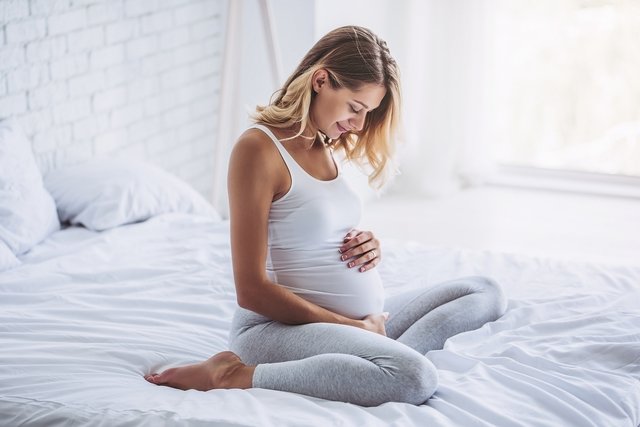Dengue fever during pregnancy is dangerous as it can interfere with blood clotting, which can cause the placenta to detach and result in miscarriage or premature birth. However, if the pregnant woman is well advised by a doctor and follows the treatment correctly, there will be no risks for the pregnant woman or the baby.
Pregnant women are more likely to develop severe dengue than women who are not pregnant, so whenever they have a fever and body pain they should go to the doctor and undergo tests to check if it is dengue.
If there are symptoms of severe dengue fever, such as severe abdominal pain and spots all over the body, you should go to the emergency room, and hospitalization may be necessary. To avoid dengue fever during pregnancy, you should avoid being bitten by mosquitoes, wearing long clothes and consuming more vitamin B. Find out how to prevent dengue fever.

Main risks
The main risks of dengue fever during pregnancy are:
- Increased risk of miscarriage at the beginning of pregnancy;
- Placental abruption;
- Changes in blood clotting;
- Hemorrhage;
- Eclampsia,
- Pre-eclampsia;
- Liver impairment;
- Kidney failure.
The risks of dengue fever are greater when a woman is at the beginning or end of her pregnancy. However, if the disease is identified and treatment is followed correctly, it is possible to prevent risks for both the pregnant woman and the baby.
Don’t ignore your symptoms!
In general, dengue fever does not harm the baby’s development, but if the mother has dengue fever at the end of pregnancy, the baby may become infected and present with a fever, red plaques and tremors in the first few days, requiring hospitalization to receive treatment.
How to prevent
The main way to prevent dengue fever is by eliminating standing water, wearing longer clothes, especially in places where there are large numbers of mosquitoes, applying repellent to areas that are most exposed to bites and lighting a citronella candle. at home, for example, as it has a repellent effect.
Furthermore, to reduce the risks of dengue during pregnancy, it is essential to be aware of dengue symptoms, such as the appearance of red spots on the skin, high fever, general malaise, pain in the back of the eyes and joints, for example, being important that the doctor be consulted as soon as they appear. Learn about other symptoms of dengue.
How the treatment is carried out
Dengue fever treatment during pregnancy is generally carried out in the hospital and, therefore, the pregnant woman has to stay hospitalized for tests, receive intravenous serum and take analgesic and antipyretic medications to control the disease and reduce possible risks such as miscarriage or bleeding.
However, in mild cases of dengue fever during pregnancy, treatment can be done at home with rest, increased water intake to keep the pregnant woman hydrated and use of medicines recommended by the doctor.
In cases of dengue hemorrhagic fever, treatment must be carried out in the hospital, with hospitalization, and it may be necessary for the pregnant woman to receive blood transfusions, although this is not a common situation. See more details on dengue treatment.
Bibliography
- FEITOZA, Helena Albuquerque Catão, et al. Maternal, fetal and child effects resulting from dengue infection during pregnancy in Rio Branco, Acre, Brazil, 2007-2012. Public Health Cad. Vol.35. 5.ed; 1-11, 2017

Sign up for our newsletter and stay up to date with exclusive news
that can transform your routine!
Warning: Undefined array key "title" in /home/storelat/public_html/wp-content/plugins/link-whisper-premium/templates/frontend/related-posts.php on line 12
Warning: Undefined array key "title_tag" in /home/storelat/public_html/wp-content/plugins/link-whisper-premium/templates/frontend/related-posts.php on line 13



